BIOL 121
Roosevelt University
All 7 results
Sort by
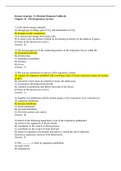
-
Roosevelt UniversityBIOL 121 Chapter 24 The Respiratory System
- Exam (elaborations) • 12 pages • 2021
-
- $9.49
- + learn more
1) Cells obtain energy primarily A) through gas exchange, gain of O2, and elimination of CO2. B) through aerobic metabolism. C) to increase the energy level of the cells. D) to assist in the movement of blood by decreasing its density by the addition of gases. E) None of the answers are correct. Answer: B 2) The last passageway of the conducting portion of the respiratory tract is called the A) terminal bronchiole. B) alveolar duct. C) respiratory bronchiole. D) alveolus. E) air sac....
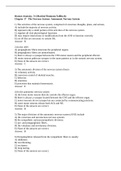
-
Chapter 17 The Nervous System Autonomic Nervous System
- Exam (elaborations) • 13 pages • 2021
-
- $16.99
- + learn more
1) The activities of the nervous system, comprised of conscious thoughts, plans, and actions, A) include the majority of nervous activity. B) represent only a small portion of the activities of the nervous system. C) regulate all vital physiological functions. D) may require instructions or modifications from the ANS to function correctly. E) are all that are necessary to sustain life. Answer: B 2) In the ANS A) preganglionic fibers innervate the peripheral organs. B) preganglionic fibe...
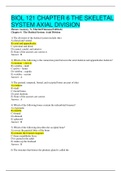
-
BIOL 121 CHAPTER 6 THE SKELETAL SYSTEM AXIAL DIVISION | VERIFIED SOLUTION
- Exam (elaborations) • 11 pages • 2021
-
- $12.49
- + learn more
BIOL 121 CHAPTER 6 THE SKELETAL SYSTEM AXIAL DIVISION Human Anatomy, 7e (Martini/Timmons/Tallitsch) Chapter 6 The Skeletal System: Axial Division 1) The divisions of the skeletal system include (the) A) dorsal and ventral. B) axial and appendicular. C) proximal and distal. D) cranial, caudal, and anterior. E) None of the answers are correct.w 2) Which of the following is the connection point between the axial skeleton and appendicular skeleton? A) sternum - clavicle B) vertebra - ...
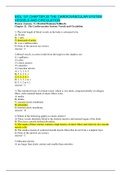
-
BIOL 121 CHAPTER 22 THE CARDIOVASCULAR SYSTEM VESSELS AND CIRCULATION
- Exam (elaborations) • 12 pages • 2021
-
- $12.49
- + learn more
BIOL 121 CHAPTER 22 THE CARDIOVASCULAR SYSTEM VESSELS AND CIRCULATION Human Anatomy, 7e (Martini/Timmons/Tallitsch) Chapter 22 The Cardiovascular System: Vessels and Circulation 1) The total length of blood vessels in the body is estimated to be A) 30 feet. B) 1 mile. C) thousands of miles. D) over a million miles. E) None of the answers are correct. 2) Blood vessels, in correct order from the largest to the smallest, are: (1) capillaries (2) aorta (3) elastic arteries (4) ar...
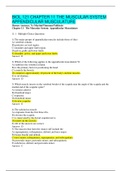
-
BIOL 121 CHAPTER 11 THE MUSCULAR SYSTEM APPENDICULAR MUSCULATURE
- Exam (elaborations) • 11 pages • 2021
-
- $12.49
- + learn more
1) The major groups of appendicular muscles include those of (the) A) vertebral column. B) posterior cervical region. C) shoulder and upper limb region. D) pelvic girdle and lower limbs. E) shoulder, pelvis, and upper and lower limbs. 2) Which of the following applies to the appendicular musculature? It A) stabilizes the vertebral column. B) is the primary factor in positioning the head. C) controls the bowels. D) comprises approximately 40 percent of the body's skeletal muscles. ...
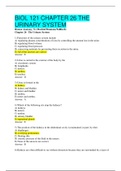
-
BIOL 121 CHAPTER 26 THE URINARY SYSTEM | VERIFIED SOLUTION
- Exam (elaborations) • 10 pages • 2021
-
- $12.49
- + learn more
) Functions of the urinary system include A) regulating plasma concentrations of ions by controlling the amount lost in the urine. B) regulating blood volume. C) regulating blood pressure. D) conserving nutrients by preventing their excretion in the urine. Urine is carried to the exterior of the body by the A) circulatory system. B) lymphoids. C) ureters. D) urethra. E) urachus. Urine is formed in the A) kidney. B) kidney and bladder. C) ureter and bladder. D) urethra. E) ureter ...
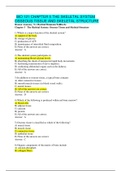
-
BIO 121 CHAPTER 5 THE SKELETAL SYSTEM OSSEOUS TISSUE AND SKELETAL STRUCTURE
- Exam (elaborations) • 11 pages • 2021
-
- $12.49
- + learn more
1) Which is a major function of the skeletal system? A) support of the body B) storage of glucose C) production of ATP D) maintenance of interstitial fluid composition E) None of the answers are correct. The skeletal system participates in A) maintaining blood calcium levels. B) absorbing the shock of unexpected rapid body movements. C) facilitating transmission of nerve impulses. D) cushioning abdominal organs such as the kidneys. E) All of the answers are correct. In addition to o...

That summary you just bought made someone very happy. Also get paid weekly? Sell your study resources on Stuvia! Discover all about earning on Stuvia


